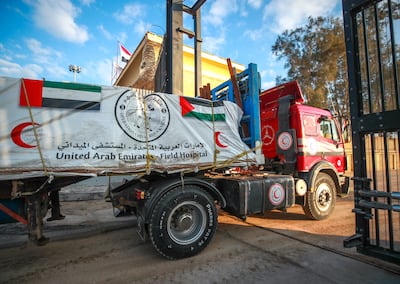Palestinians woke up on Monday to news of the border crossing between Egypt and Gaza being reopened to allow in a limited amount of aid amid Israel’s continued bombing campaign in the Palestinian enclave. Any optimism, however, was quickly overshadowed by renewed threats of an Israeli ground invasion of Rafah – the border area’s main city.
As many of Gaza’s 1.4 million displaced residents were sheltering in Rafah, where temperatures dropped to 10°C on Sunday night, retired Israeli general Benny Gantz, part of Prime Minister Benjamin Netanyahu’s three-member war cabinet, told a conference of Jewish-American leaders that if the remaining Israeli hostages in Gaza were not freed by the start of Ramadan, “the fighting will continue to the Rafah area”. Mr Netanyahu has brushed off the growing calls to halt his country’s military offensive, promising to “finish the job”.
Historically, Ramadan has often been a time of acute tension as Islam's third holiest site, Al Aqsa Mosque in Al Haram Al Sharif, remains under Israeli occupation and access to it is often impeded by Israeli forces. For Mr Gantz to use the start of the holy month as a military deadline is reckless. Unhelpfully, this has been accompanied by demands from Israel’s right-wing National Security Minister Itamar Ben-Gvir to restrict Muslim access to Al Aqsa during the holy month, something that could enflame an already highly volatile situation.

Such developments serve only to increase tensions. There must be a ceasefire or at least a halting of Israeli attacks, without condition. Hamas and other Palestinian militant groups should release the remaining Israeli hostages. The abductions of civilians on October 7 cannot be justified, and in addition to the injustice of kidnapping and holding non-combatants, the presence of these abductees offers little deterrence to an Israeli military that has proved itself willing to kill large numbers of Palestinians to free even a handful of hostages.
Keeping civilian hostages helps provide a pretext for Israel’s armed forces to persist with this calamitous war in Gaza. Israelis are understandably concerned about the hostages’ fate, whatever misgivings they may have about their political leaders or the direction their country is taking.
At the same time, large numbers of Palestinians have been taken by Israeli forces since October 7, leaving many families in the dark as to their condition and whereabouts. Worrying videos have already emerged of rows of Palestinian men – stripped, blindfolded and handcuffed – being watched over by Israeli troops in Gaza. Last week, prisoners’ rights groups said more than 7,000 Palestinians have been detained in the West Bank since the Hamas attacks in October, and on Sunday, the families of 62 Gaza residents detained during the war failed in a legal bid to get more information about their loved ones. Kidnapping Israelis is wrong, as is detaining Palestinians indefinitely without charge in the manner of Israel’s “administrative detention” system.
In the case of Rafah, an even bigger disaster awaits the large proportion of Gaza’s population seeking some kind of refuge there. Coupling the fates of Israeli hostages and Palestinian prisoners to demands for a ceasefire and a full Israeli withdrawal is increasingly looking like a tactic that could lead to even more suffering for Gazan civilians.


